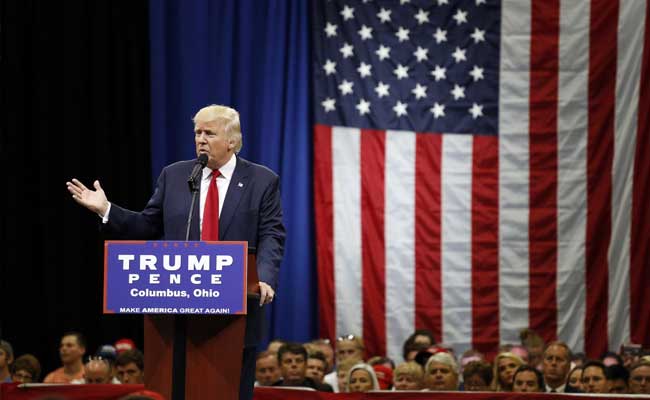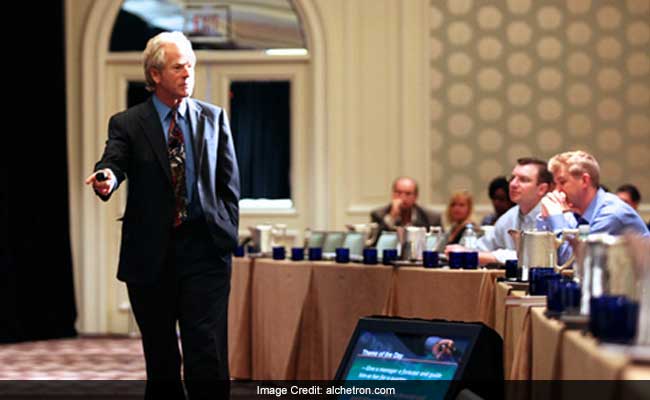Trump praised a Navarro book and documentary film critical of China, and while the economist has never met the candidate, he describes a campaign role as follows: "I now work closely with the campaign on issues related to the economy, trade, China, and foreign policy in Asia." He endorsed and defended Trump in a March essay, and given that relatively few academic economists have embraced the Trump candidacy, Navarro is plausibly a leading candidate for a top job in a Trump administration.
It's easy enough to imagine Navarro working in government. He teaches at a highly regarded research university, has extensive private sector, investment, and media experience, has a Ph.D from Harvard, has written on management and wrote an investment newsletter. His documentary, "Death by China," is available on YouTube and Netflix.
He has largely operated under the radar, perhaps because he is a successful but not famous academic. In reality, he has been one of the most versatile and productive American economists of the last few decades, and has played a leading role in turning the Republican Party away from what's left of its historical optimism about U.S.-China relations.
Navarro's best-cited article is on why businesses might give to charity, and he has pieces on energy topics like electricity deregulation and the costs of nuclear power.
Some of the more unusual topics he has researched include the suitability of the business school curriculum, the quality of online learning (he has done extensive online teaching), the costs of terrorism and the economics of household trash collection. In a time when academic specialization was becoming much more the norm, Navarro carved out a career as an economic generalist.

Peter Navarro endorsed and defended Donald Trump in an essay that came out in March. (AFP)
After his electoral attempts, he emphasized investment advising. In 2002 he published "If It's Raining in Brazil, Buy Starbucks." The book tells investors that if they understand the right macroeconomics, they will reap superior returns, a phenomenon he calls "macrowave investing."
Yet there's scant evidence that individuals can make money this way. Other market players know the same macroeconomics and most investors are better off avoiding the trading costs and simply buying and holding. Similarly, Navarro's investment precept, "Never buck the trend," is at best an oversimplification, at worst outright wrong.
His 2009 book, "Always a Winner: Finding Your Competitive Advantage in an Up and Down Economy," also promises too much, this time on the management side. He overestimates the ability of the individual businessman to forecast the business cycle, or to learn forecasting from a popular book. The phrase "always a winner" comes across as an overreach.
Navarro has lately been in a China phase, with three books, numerous articles and the documentary, and that is the work that has resonated with the Trump campaign. But which Navarro shows up on this topic, the scholar or the salesman? Both.
I expected to hate his "Crouching Tiger: What China's Militarism Means for the World," but instead I found it to be an intelligent discussion of the problems likely to result from a more assertive China. That said, Navarro does not come close to demonstrating his opening prediction that future war with China is "very likely." In contrast, his "The Coming China Wars" is mostly a series of emotional diatribes against the Chinese government, opening with charges of cheating and slave labor and never much considering the positive side of Chinese economic growth.

Peter Navarro has a Ph.D. from Harvard and has extensive private sector, investment, and media experience
Navarro's other writings on China have hovered between these extremes of tone, but in general he has been pushing the line that the U.S. should be tough on trade, crack down on intellectual property theft, tax Chinese exports, combat Chinese mercantilism, bring jobs home, and yes, make America great again. If you want to read one thinker to understand Trump on China, it is Navarro.
Navarro has yet another side, expressed in the 2010 book he wrote with the Columbia University economist Glenn Hubbard, "Seeds of Destruction: Why the Path to Economic Ruin Runs through Washington, and How to Reclaim American Prosperity." At the time, I took this to be a manifesto for the Republican presidential campaign to come in 2012. It is mainstream market-oriented Republicanism, with a section on trade that balances Navarro's tough stance and Hubbard's more classically free market approach. In retrospect, it is a kind of transition document showing cracks in the previous Republican globalist facade.
If Navarro makes it to the White House, he'll have plenty of ideas to draw upon, but which ones will they be? Looking at his career as a whole, the most central idea seems to be that there are diverse paths to influence, and on that he is surely right.
- Tyler Cowen is a Bloomberg View columnist. He is a professor of economics at George Mason University and writes for the blog Marginal Revolution. His books include "Average Is Over: Powering America Beyond the Age of the Great Stagnation."
© 2016 Bloomberg
(Except for the headline, this story has not been edited by NDTV staff and is published from a syndicated feed.)


